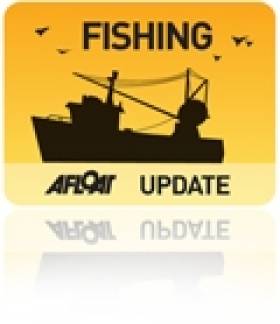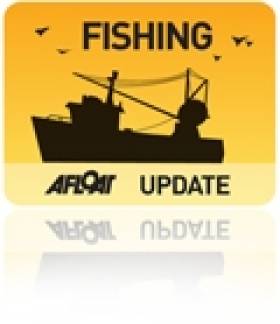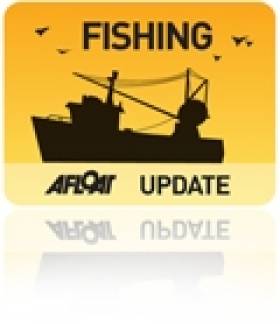Displaying items by tag: Department of Agriculture, Fisheries and Food
Ministers Meet to Identify Fishing Priorities
Minister Connick described the meeting as "a good exchange of views on significant issues affecting all sectors of our fishing industries, north and south."
The topics discussed by the Ministers included the impacts of the Cod Recovery Plan, the management of the prawn fishery in the Irish Sea, the upcoming EU negotiations on fishing opportunities for 2011 and the Community's review of the Common Fisheries Policy.
Minister Connick said, "Minister Gildernew and I had a very good discussion. Our meeting was a valuable opportunity for us to examine these important issues together and to explore areas of mutual interest. I am committed to working together with Minister Gildernew over the coming months, to help safeguard the interests of Irish fishermen."
Connick Leads Criticism of 'Unsustainable' Mackerel Fishing by Iceland and Faeroes
Minister Connick said "I want to see a fair deal to resolve this issue and secure the future for our fishermen and fish factories. However, I made it clear that I will not accept a deal at any price."
Currently Iceland and the Faroe Islands are acting unilaterally and outside of normal fishery management protocols and their actions pose a serious threat to the well being of the mackerel stock which economically, is Ireland's most important stock. The item was placed on today's agenda in advance of the intensive negotiations on mackerel management due to commence in October and as a follow up to the June Council where Ireland lead the debate.
Minister Connick reiterated his dismay at the continuing irresponsible fishing by Iceland and the Faroes on the mackerel stock, and his desire to see a resolution to the situation. So far in 2010, Iceland has caught about 115,000 tonnes which is more than 25 times their catch four years ago. In the case of the Faroes, their 85,000 tonnes is more than 3 times their catch in 2006. Ireland's quota in 2010 is 62,000 tonnes.
The Minister said "Ireland has consistently supported the need to reach an international agreement on mackerel management. However we can only accept an agreement that is fair and proportionate. We consider that the current fishing levels by Iceland and the Faroes are totally unjustified and that any eventual agreement must involve much reduced levels of fishing by these countries. We must robustly put our case and minimise the final cost to our fishermen."
The long term stability of the lucrative mackerel stock is of paramount importance to Ireland and in urging for increased intensification of efforts to reach a solution the Minister advised the Council that "It is my opinion that a joint approach with Norway, considering our long term agreement with them, would have added weight and would be more likely to succeed".
Minister Connick said, "I was heartened by the widespread support of my EU colleagues for the concerns that I first raised on this issue at the June Council".
There will be intensive negotiations over the autumn and the Minister committed that Ireland would work closely with other Member States and the Commission to consider all options to make progress and find a basis for a long term agreement. The Minister emphasised the critical importance of securing fair and equitable arrangements at international level that will deliver a sustainable mackerel fishery for the Irish fleet and ensure the continued prosperity of the seafood processing sector in coastal communities.
Seafood Companies Get €1.75m Boost
Sean Connick TD, Minister of State at the Department of Agriculture, Fisheries and Food today announced €1.13 million in grant-aid for Irish Seafood Processing companies under the Seafood Processing Business Development Scheme, and a further €623,620 for aquaculture companies under the Commercial Aquaculture Development Scheme. This represents a total investment of €1.75 million in 15 seafood processing and aquaculture projects. Both schemes form part of the Seafood National Programme 2007-2013, funded under the National Development Plan 2007-2013. Development of both of these areas, seafood processing and aquaculture, are key elements in the recently published 2020 Food Harvest Report.
The Seafood Processing Business Development Scheme is aimed at SME’s who have solid business plans focused on adding value to Irish seafood products on both domestic and overseas markets. The qualifying projects all exemplify dynamic ideas in new product development and innovation. Grant-assistance of up to 25% on capital expenditure required for the production of value added products and for improvements in processes and quality beyond legislative requirements is being provided.
The Commercial Aquaculture Development Scheme is aimed at assisting fish and shellfish farmers to invest in their businesses. The approved projects are examples of companies that are looking to improve their efficiency through technology transfer and have a strong focus on quality, matched with the demands of the market. The measure provides for grant aid of up to 40% of eligible capital expenditure.
|
Company Name |
Eligible Expenditure € |
Grant Approved € |
|
Seafood Processing Business Investment Scheme 2010
Chillchiaran Eisc Teo. |
46,860 |
11,715 |
|
Connemara Seafood Frozen Ltd. |
184,000 |
46,000 |
|
De Brun Iasc Teo. |
16,500 |
4,125 |
|
Earagail Eisc Teo. |
517,000 |
129,250 |
|
Fastnet Mussels Ltd. |
225,000 |
56,250 |
|
Keohane Seafood Ltd. |
181,000 |
45,250 |
|
O Cathain Iasc Teo. |
294,000 |
73,500 |
|
Sean Ward(Fish Exports) Ltd. |
1,923,000 |
480,750 |
|
Sofrimar Ltd. |
1,133,000 |
283,250 |
|
|
|
|
|
Total |
4,520,360 |
1,130,090 |
|
|
|
|
|
Commercial Aquaculture Development Scheme |
|
|
|
Sliogéisc na Rossan Teo. |
299,400 |
119,760 |
|
Feirm Mara Oilean Acla Teo |
280,000 |
112,000 |
|
IDAS Limited |
73,630 |
29,452 |
|
Goatsbridge Trout Farm Limited |
637,000 |
254,800 |
|
Fastnet Mussels Limited |
29,500 |
11,800 |
|
Curraun Blue Limited |
239,520 |
95,808 |
|
|
|
|
|
Total |
1,559,050 |
623,620 |


























































